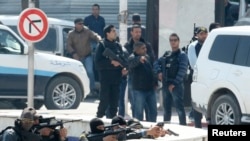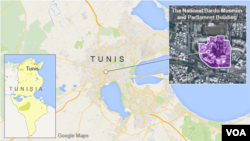Gunmen opened fire at one of the Tunisian capital's top tourism sites on Wednesday in an attack that left at least 22 people dead, mainly foreign visitors.
Prime Minster Habib Essid said two armed assailants wearing military-style uniforms "hunted and chased down" tourists at the National Bardo Museum in Tunis before taking a small group captive.
Two attackers were killed in the ensuing police operation that freed the hostages; Tunisian authorities say they are searching for up to three possible accomplices. It remains unclear who the gunmen are.
Among the dead are at least 17 tourists, including victims from Colombia, France, Germany, Italy, Poland and Spain, and two Tunisians, Essid said during a press conference. More than two dozen others were injured.
Tunisian television showed images of older tourists and children fleeing the scene under the cover of armed security forces. A spokesman for the Interior Ministry said at least 100 people were inside the museum at the time of the attack.
Nearby, the Tunisian parliament was evacuated. Lawmakers were meeting at the time of the attack to debate anti-terrorism legislation.
Member of Parliament Sayida Ounissi said the minister of justice, judges and several army officials were inside the building. She posted on Twitter during the evacuation, "we are not afraid."
Tunisian President Beji Caid Essebsi, who visited victims of the attack in a Tunis hospital Wednesday afternoon, told AFP "the authorities have taken all measures to ensure that such things don't happen" again.
In a television address to the nation Wednesday evening, Essebsi said, "I want the people of Tunisia to understand firstly and lastly that we are in a war with terror, and these savage minority groups will not frighten us.''
The United States is among several countries to condemn the killings.
"We commend Tunisian authorities’ rapid response to today’s wanton violence and their efforts to resolve the hostage situation and restore calm," Secretary of State John Kerry said in an emailed statement. "The United States stands with the Tunisian people at this difficult time."
French Prime Minister Manuel Valls called the attack an act of terrorism.
"This attack cruelly illustrates the threat that we are all confronted with in Europe, in the Mediterranean, around the world," Valls said. "France, Tunisia and Europe will act together to fight terrorism."
Cairo-based political sociologist Said Sadek told VOA that militants in Tunisia have in the past targeted security forces, making Wednesday’s attack especially disturbing.
“Terrorists pick targets because they know it will have certain impacts. It’s not just killing unknown tourists in a museum. They want to kill Tunisia," said Sadek. "They want to kill the economy of Tunisia. So this is really the target."
While it’s not yet clear who is responsible for the attack, Sadek says its likely one of many militant groups that have flourished since 2011, when Arab Spring uprooted the country’s security apparatus as weapons poured out of neighboring Libya.
The increasing availability and sophistication of weapons in the region, he added, have made it possible for a large attack to be conducted by a small number of militants.
Other analysts said the attack not only targeted Tunisia's tourism sector but was a response to the government’s recent crackdown on supporters of the Islamic State group.
Yan St. Pierre, CEO of the Berlin-based security firm MOSECON, said the museum's physical proximity to parliament could have could be what made it an enticing target for militants who sought to disrupt the work of government — members of parliament were scheduled to pass even tougher anti-terrorism laws on Wednesday.
“It allowed them to disrupt voting on that bill," St. Pierre said. "They succeeded. They had to evacuate parliament because of the attack on the Bardo."
St. Pierre believes the attack could have the long-term impact of making the Tunisian government, which he said remains in transition, even more fragile.
Members of parliament were scheduled to reconvene Wednesday night in an extraordinary session.
But St. Pierre added that as chaos in neighboring Libya only deepens regional insecurity, he expects terrorist attacks on soft targets to continue.
HuffPost Tunisia journalist Emilie Gline said that with tourism season in Tunis about to start, the timing could not be worse for the country's economy.
“It’s always surprising when something like that happens when you are sitting in Tunisia," Gline said. Even if we knew there was a risk about an attack, we were surprised."
Some information for this report comes from AP.





